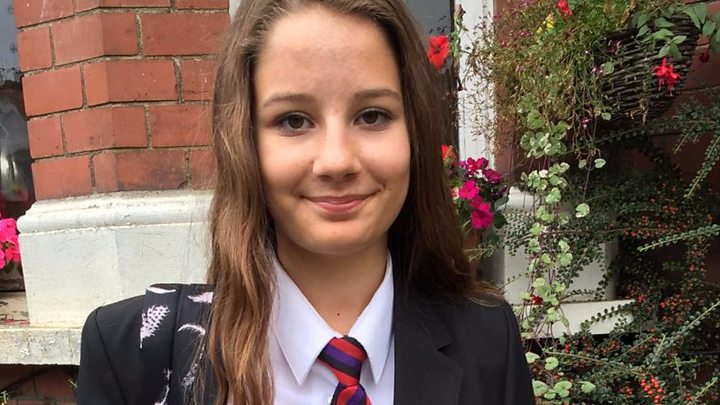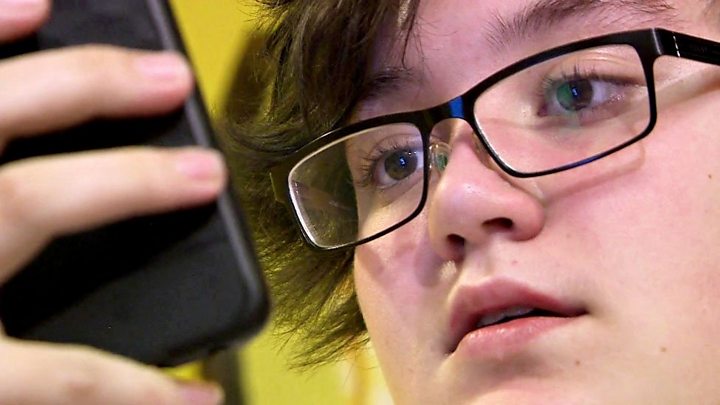Self-harm content 'grooms people to take own lives'

Harmful suicide and self-harm content online "has the effect of grooming people to take their own lives", the suicide prevention minister has said.
Jackie Doyle-Price has told the BBC that social media companies need to "step up to the plate" and use their algorithms to protect vulnerable users.
It comes after links were made between the suicide of teenager Molly Russell and her exposure to harmful content.
Ms Doyle-Price will meet Facebook later to discuss what action it is taking.
She told BBC Breakfast: "We want social media not really to be doing this through the stick of the law, we want them to do it to look after their users."
She said she hoped senior staff at Facebook, which also owns Instagram, would act, adding: "Sometimes they do, but more often they don't".
In a speech later, Ms Doyle-Price is expected to tell the National Suicide Prevention Alliance Conference that internet and social media providers "ought to want to do this".
"They shouldn't wait for government to tell them what to do. It says a lot about the values of companies if they do not take action voluntarily."
She is expected to echo Health Secretary Matt Hancock's recent warning that the government is prepared to introduce new legislation "where needed" to tackle the issue.
"If companies cannot behave responsibly and protect their users, we will legislate," she will say.
She told the BBC: "We could use fines, we could make social media companies much more responsible and apply the full force of the law to them if we feel they are being negligent in their duty of care to their users."
Ms Doyle-Price said the father of Molly Russell, who took her own life in 2017 aged 14, had done much to highlight the issue.
"I am full of admiration for Molly's father for being so brave and frank," she said.
Molly's father, Ian Russell, told the BBC he believed Instagram had "helped kill my daughter".
When her family looked at her Instagram account after her death, they found distressing material about depression and suicide.
Molly case 'has focused minds'
Ms Doyle-Price said that after Mr Russell spoke out, "so many other parents have spoken out...it has really focused people's minds".
She added: "The really shocking thing is that he had absolutely no idea that his daughter was looking at these things online."
The boss of Instagram, Adam Mosseri, is due to meet the health secretary this week over the platform's handling of content promoting self-harm and suicide.
Writing in the Daily Telegraph, he said Molly's case had left him "deeply moved" and he accepted the site had work to do.
He wrote: "We rely heavily on our community to report this content, and remove it as soon as it's found.
"The bottom line is we do not yet find enough of these images before they're seen by other people."
'Hooked on self-harm'

In a separate case, Libby, 16, and her father Ian have shared their story after hearing of Molly's death.
At the age of 12, Libby, became "hooked" on posting and viewing self-harm images on Instagram - including pictures of cutting, burning and overdosing.
Her father said his family reported such images to Instagram, but the social media company did nothing.
Speaking to the BBC, Libby described how she was drawn in to an online community and recalled sharing pictures of her fresh cuts with 8,000 followers.
Read more of her story here.
Government 'considering all options'
NHS England chief executive Simon Stevens has proposed the introduction of a mental health levy on social media firms.
The government said it has "heard calls" for an internet regulator and to place a duty of care on internet platforms and was "seriously considering all options".
The Department for Culture, Media and Sport (DCMS) and the Home Office are due to publish a white paper on the government's approach to online safety later this year.
A DCMS spokesman said: "Social media companies clearly need to do more to ensure they are not promoting harmful content to vulnerable people.
"Our forthcoming white paper will set out their responsibilities, how they should be met and what should happen if they are not."
If you've been affected by self-harm, eating disorders or emotional distress, help and support is available via the BBC Action Line.